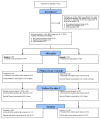Inflammatory Prostatitis Plus IBS-D Subtype and Correlation with Immunomodulating Agent Imbalance in Seminal Plasma: Novel Combined Treatment
- PMID: 39452503
- PMCID: PMC11508116
- DOI: 10.3390/diseases12100260
Inflammatory Prostatitis Plus IBS-D Subtype and Correlation with Immunomodulating Agent Imbalance in Seminal Plasma: Novel Combined Treatment
Abstract
We recently demonstrated the effectiveness of long-term treatment with rifaximin and the probiotic DSF (De Simone formulation) in improving urogenital and gastrointestinal symptoms in patients with both chronic inflammatory prostatitis (IIIa prostatitis) and diarrhea-predominant irritable bowel syndrome (IBS-D), relative to patients with IBS-D alone. Because the low-grade inflammation of the intestine and prostate may be one of the reasons for co-developing both IIIa prostatitis and IBS-D, we designed the present study to once again evaluate the efficacy of combined rifaximin and DSF treatment in patients affected by IIIa prostatitis plus IBS-D, but we also measured seminal plasma pro-inflammatory (IL-6) and anti-inflammatory (IL-10) cytokines before and after treatment. Methods: We consecutively enrolled 124 patients with IIIa prostatitis and IBS-D (diagnosed using the Rome III criteria). Patients were randomized into two groups: group A (n = 64) was treated with rifaximin (seven days per month for three months) followed by DSF, and group B (n = 60) was treated with a placebo. By the end of the intervention, 68.7% and 62.5% of patients from group A reported improved NIH-CPSI (National Institute of Health's Chronic Prostatitis Symptom Index) and IBS-SSS (Irritable Bowel Syndrome Severity Scoring System) scores, respectively, compared to only 3.3% and 5% of the placebo group. Group A patients also had significantly lower mean seminal plasma levels of IL-6 (11.3 vs. 32.4 pg/mL) and significantly higher mean levels of IL-10 (7.9 vs. 4.4 pg/mL) relative to baseline, whereas the levels of IL-6 and IL-10 did not change in the placebo group. Conclusions: The combined treatment with rifaximin and DSF appears to represent the optimal approach for addressing a syndrome such as irritable bowel syndrome (IBS-D plus), which frequently co-occurs with prostatitis (IIIa prostatitis). This approach is particularly beneficial in cases where the symptoms are not always clearly delineated, the etiology is multifactorial, and the diagnosis is multilevel.
Keywords: DSF probiotics; IBS severity scoring system; inflammatory prostatitis; interleukins; irritable bowel syndrome; rifaximin; seminal plasma.
Conflict of interest statement
The authors declare no conflicts of interest.
Figures
References
LinkOut - more resources
Full Text Sources


